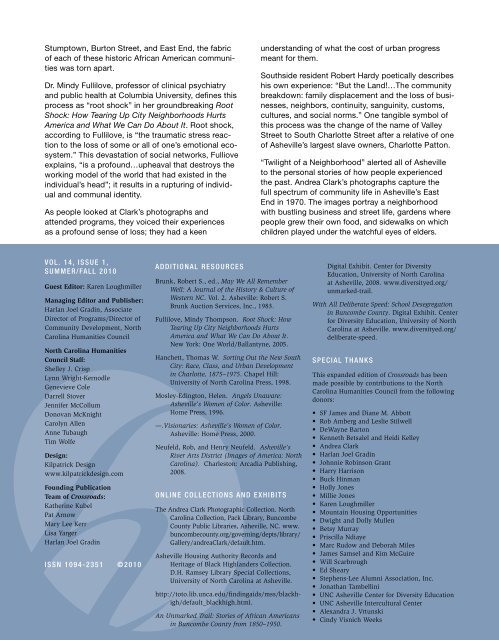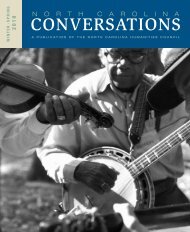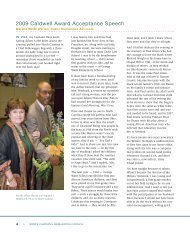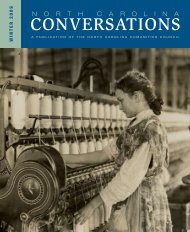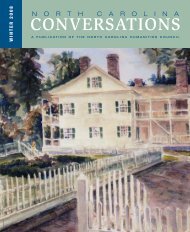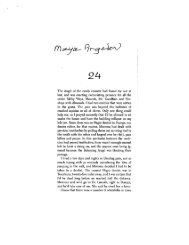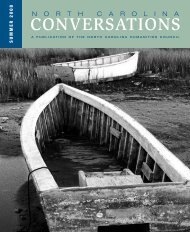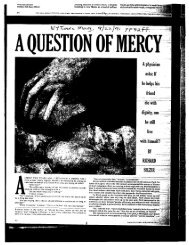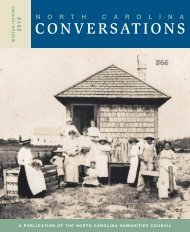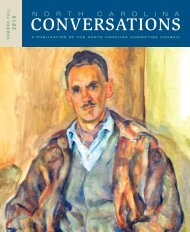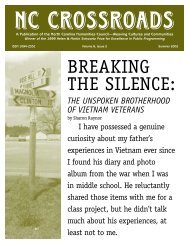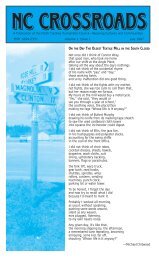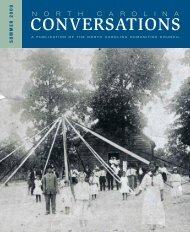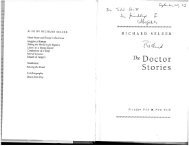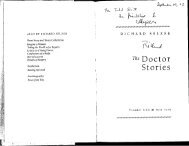Twilight of a Neighborhood - North Carolina Humanities Council
Twilight of a Neighborhood - North Carolina Humanities Council
Twilight of a Neighborhood - North Carolina Humanities Council
You also want an ePaper? Increase the reach of your titles
YUMPU automatically turns print PDFs into web optimized ePapers that Google loves.
Stumptown, Burton Street, and East End, the fabric<br />
<strong>of</strong> each <strong>of</strong> these historic African American communities<br />
was torn apart.<br />
Dr. Mindy Fullilove, pr<strong>of</strong>essor <strong>of</strong> clinical psychiatry<br />
and public health at Columbia University, defines this<br />
process as “root shock” in her groundbreaking Root<br />
Shock: How Tearing Up City <strong>Neighborhood</strong>s Hurts<br />
America and What We Can Do About It. root shock,<br />
according to Fullilove, is “the traumatic stress reaction<br />
to the loss <strong>of</strong> some or all <strong>of</strong> one’s emotional ecosystem.”<br />
This devastation <strong>of</strong> social networks, Fulliove<br />
explains, “is a pr<strong>of</strong>ound…upheaval that destroys the<br />
working model <strong>of</strong> the world that had existed in the<br />
individual’s head”; it results in a rupturing <strong>of</strong> individual<br />
and communal identity.<br />
As people looked at Clark’s photographs and<br />
attended programs, they voiced their experiences<br />
as a pr<strong>of</strong>ound sense <strong>of</strong> loss; they had a keen<br />
Vol. 14, Issue 1,<br />
s ummer/Fall 2010<br />
Guest Editor: Karen Loughmiller<br />
Managing Editor and Publisher:<br />
Harlan Joel Gradin, Associate<br />
Director <strong>of</strong> Programs/Director <strong>of</strong><br />
Community Development, <strong>North</strong><br />
<strong>Carolina</strong> <strong>Humanities</strong> <strong>Council</strong><br />
<strong>North</strong> <strong>Carolina</strong> <strong>Humanities</strong><br />
<strong>Council</strong> Staff:<br />
Shelley J. Crisp<br />
Lynn Wright-Kernodle<br />
Genevieve Cole<br />
Darrell Stover<br />
Jennifer McCollum<br />
Donovan McKnight<br />
Carolyn Allen<br />
Anne Tubaugh<br />
Tim Wolfe<br />
Design:<br />
Kilpatrick Design<br />
www.kilpatrickdesign.com<br />
Founding Publication<br />
Team <strong>of</strong> Crossroads:<br />
Katherine Kubel<br />
Pat Arnow<br />
Mary Lee Kerr<br />
Lisa Yarger<br />
Harlan Joel Gradin<br />
IssN 1094-2351 ©2010<br />
addItIoNal resources<br />
Brunk, Robert S., ed., May We All Remember<br />
Well: A Journal <strong>of</strong> the History & Culture <strong>of</strong><br />
Western NC. Vol. 2. Asheville: Robert S.<br />
Brunk Auction Services, Inc., 1983.<br />
Fullilove, Mindy Thompson. Root Shock: How<br />
Tearing Up City <strong>Neighborhood</strong>s Hurts<br />
America and What We Can Do About It.<br />
New York: One World/Ballantyne, 2005.<br />
Hanchett, Thomas W. Sorting Out the New South<br />
City: Race, Class, and Urban Development<br />
in Charlotte, 1875–1975. Chapel Hill:<br />
University <strong>of</strong> <strong>North</strong> <strong>Carolina</strong> Press, 1998.<br />
Mosley-Edington, Helen. Angels Unaware:<br />
Asheville’s Women <strong>of</strong> Color. Asheville:<br />
Home Press, 1996.<br />
—.Visionaries: Asheville’s Women <strong>of</strong> Color.<br />
Asheville: Home Press, 2000.<br />
Neufeld, Rob, and Henry Neufeld. Asheville’s<br />
River Arts District (Images <strong>of</strong> America: <strong>North</strong><br />
<strong>Carolina</strong>). Charleston: Arcadia Publishing,<br />
2008.<br />
oNlINe collectIoNs aNd exhIbIts<br />
The Andrea Clark Photographic Collection. <strong>North</strong><br />
<strong>Carolina</strong> Collection, Pack Library, Buncombe<br />
County Public Libraries, Asheville, NC. www.<br />
buncombecounty.org/governing/depts/library/<br />
Gallery/andreaClark/default.htm.<br />
Asheville Housing Authority Records and<br />
Heritage <strong>of</strong> Black Highlanders Collection.<br />
D.H. Ramsey Library Special Collections,<br />
University <strong>of</strong> <strong>North</strong> <strong>Carolina</strong> at Asheville.<br />
http://toto.lib.unca.edu/findingaids/mss/blackhigh/default_blackhigh.html.<br />
An Unmarked Trail: Stories <strong>of</strong> African Americans<br />
in Buncombe County from 1850–1950.<br />
understanding <strong>of</strong> what the cost <strong>of</strong> urban progress<br />
meant for them.<br />
Southside resident robert Hardy poetically describes<br />
his own experience: “But the Land!…The community<br />
breakdown: family displacement and the loss <strong>of</strong> businesses,<br />
neighbors, continuity, sanguinity, customs,<br />
cultures, and social norms.” One tangible symbol <strong>of</strong><br />
this process was the change <strong>of</strong> the name <strong>of</strong> valley<br />
Street to South Charlotte Street after a relative <strong>of</strong> one<br />
<strong>of</strong> Asheville’s largest slave owners, Charlotte Patton.<br />
“<strong>Twilight</strong> <strong>of</strong> a neighborhood” alerted all <strong>of</strong> Asheville<br />
to the personal stories <strong>of</strong> how people experienced<br />
the past. Andrea Clark’s photographs capture the<br />
full spectrum <strong>of</strong> community life in Asheville’s East<br />
End in 1970. The images portray a neighborhood<br />
with bustling business and street life, gardens where<br />
people grew their own food, and sidewalks on which<br />
children played under the watchful eyes <strong>of</strong> elders.<br />
Digital Exhibit. Center for Diversity<br />
Education, University <strong>of</strong> <strong>North</strong> <strong>Carolina</strong><br />
at Asheville, 2008. www.diversityed.org/<br />
unmarked-trail.<br />
With All Deliberate Speed: School Desegregation<br />
in Buncombe County. Digital Exhibit. Center<br />
for Diversity Education, University <strong>of</strong> <strong>North</strong><br />
<strong>Carolina</strong> at Asheville. www.diversityed.org/<br />
deliberate-speed.<br />
specIal thaNks<br />
This expanded edition <strong>of</strong> Crossroads has been<br />
made possible by contributions to the <strong>North</strong><br />
<strong>Carolina</strong> <strong>Humanities</strong> <strong>Council</strong> from the following<br />
donors:<br />
• SF James and Diane M. Abbott<br />
• Rob Amberg and Leslie Stilwell<br />
• DeWayne Barton<br />
• Kenneth Betsalel and Heidi Kelley<br />
• Andrea Clark<br />
• Harlan Joel Gradin<br />
• Johnnie Robinson Grant<br />
• Harry Harrison<br />
• Buck Hinman<br />
• Holly Jones<br />
• Millie Jones<br />
• Karen Loughmiller<br />
• Mountain Housing Opportunities<br />
• Dwight and Dolly Mullen<br />
• Betsy Murray<br />
• Priscilla Ndiaye<br />
• Marc Rudow and Deborah Miles<br />
• James Samsel and Kim McGuire<br />
• Will Scarbrough<br />
• Ed Sheary<br />
• Stephens-Lee Alumni Association, Inc.<br />
• Jonathan Tambellini<br />
• UNC Asheville Center for Diversity Education<br />
• UNC Asheville Intercultural Center<br />
• Alexandra J. Vrtunski<br />
•<br />
Cindy Visnich Weeks


